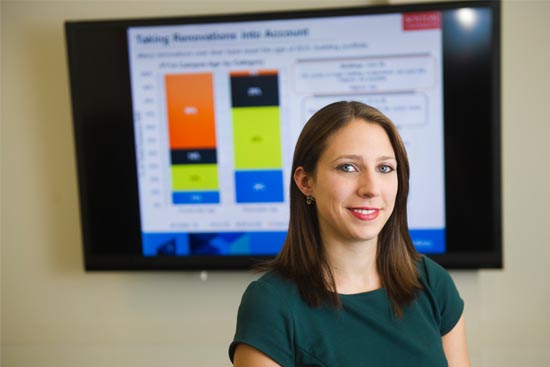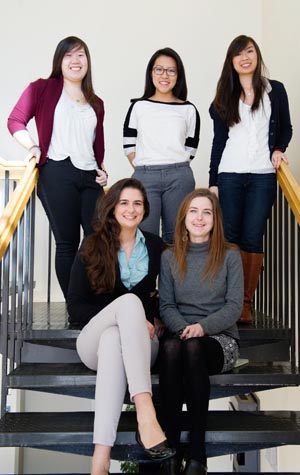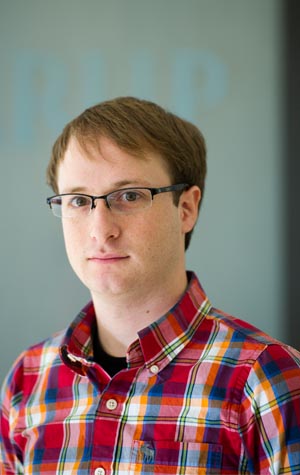Sustainability@BU Internship a Launch Pad to Employment
Students landed jobs at firms like Thornton Tomasetti, Arrowstreet

Meredith Withelder (CAS’12) is an analyst with Sightlines and has BU as one of her clients. Photos by Cydney Scott
Internships used to be shorthand for unpaid positions staffed by students who filled their days making copies, fetching coffee, or answering phones. Nowadays, internships more frequently offer hands-on learning, a legitimate bridge from the theory students learn in the classroom to the skills necessary for their chosen profession. Many pay decent wages and can even lead to job offers after graduation.
One example of this new model is the internship program offered by Sustainability@BU. Students interested in green building, renewable energies, and environmental policy helm major projects and gather data the University uses to decrease its environmental footprint, all while building strong relationships with campus partners involved in the sustainability effort.
“We really try to give each intern ownership over a project so they come away with something that is meaningful,” says Dennis Carlberg, the University’s sustainability director.
Since arriving in 2009, Carlberg has hired at least 20 undergraduate and graduate students from the College of Arts & Sciences (a significant number are environmental analysis and policy majors), the School of Management, the College of Engineering, the College of Communication, and the College of Fine Arts.

Carlberg and sustainability outreach coordinator Lisa Tornatore say they typically have a specific project in mind when seeking an intern and put out feelers among on-campus contacts to identify candidates. Oftentimes, professors will recommend star students, and occasionally the department will send an email advertising the open post. “Normally, it’s word of mouth,” Tornatore says. Most student interns arrive as sophomores and stay through the rest of their college careers.
Ryan Peters (ENG’17) started working at Sustainability@BU last fall and now runs BU’s Chevrolet Campus Clean Energy Campaign. The company identified BU as a regional leader in clean energy (BU has reduced its greenhouse gas emissions by 25 percent, despite growing in size by 14 percent, since 2006) and asked to buy some of its carbon credits to retire them permanently.
Chevy is helping BU validate its carbon credits, a fairly lengthy and expensive process that requires a third-party expert. The Rochester Institute of Technology, the University of Wisconsin at Steven’s Point, the University of Illinois at Chicago, and Portland State University are among the other institutions working with Chevy on the campaign.
The project is ideal for Peters, who hopes to develop clean energy as an engineer following graduation. “This is a way to bridge that gap and get a little bit of experience, get my feet wet, in the industry,” he says. The job has also given him plenty of networking opportunities. “The consultant that I’ve been working with has been pulling for me and making connections.”
Sustainability@BU interns often travel to the yearly Association for the Advancement of Sustainability in Higher Education (AASHE) conference, where they meet a broad range of contacts, which often leads to job offers at well-known places like global engineering firms Arup and Thornton Tomasetti, energy intelligence software and service provider EnerNOC, and architectural firm Arrowstreet.
A double major in mechanical engineering and sculpture, Juliette Vandame (CFA’15, ENG’16) started working a year ago as Sustainability@BU’s survey coordinator for Sustainability Tracking, Assessment & Rating System (STARS), AASHE’s self-reporting system that universities use to gauge their progress toward sustainability. She collects data from a variety of offices and informs staff about additional steps that can be taken to encourage green behavior.
“I definitely think the responsibilities I have are at a completely different level than what most interns have” in other campus offices, Vandame says. “I’m so grateful to work with people who are so passionate about what they’re doing and really believe that change is possible, particularly as an intern.”

Patrick Pease (ENG’11,’12) began his internship in summer 2011, one of Carlberg’s first crop of interns. His job was to track data on such things as the University’s energy and recycling rates and waste production and water usage, information that later appeared on Sustainability@BU’s website and posters. The internship, he says, “helped me refocus my whole career path from manufacturing into the built environment.”
It was a fortuitous switch. Pease got a job with Arup right after graduation and now gathers information from engineers and architects to complete energy models for new buildings. One of his current projects is BU’s new Center for Integrated Life Sciences & Engineering, which is expected to break ground in May or early summer this year.
Meredith Withelder (CAS’12), another former intern, kept in touch with her alma mater while working as an analyst for Sightlines, a facilities asset advisory firm that is benchmarking and assessing BU’s facilities management. She was offered the job after chatting with company representatives at the AASHE conference, which she attended with Carlberg. She recently left Sightlines to return to BU as the new operations financial analyst for Facilities Management & Planning.
Withelder started working for Carlberg as a junior and was put in charge of STARS and the office’s first strategic plan. “I had the opportunity to meet with a bunch of different stakeholders on campus,” she says. “I really got to see how BU works behind the scenes.” The environmental analysis and policy major was able to directly apply what she was learning in the classroom to her internship, where she wrote policies and plans for the office.
“It wasn’t an internship where I got to show up and play on the computer,” Withelder says. “I was constantly busy. It was a good thing for me. That’s how my job time is now. I have zero downtime. It’s nice to have kept that pace.”
Ian Johnson (GRS’12) says he was able to quit a horrible job doing asbestos and mold remediation when he became a Sustainability@BU intern in summer 2010, at a time Carlberg was “beyond overwhelmed” with responsibilities. Johnson worked on a number of projects: gathering metrics for waste, water, and electricity consumption, helping design the office website, and organizing LEED certification for 85-87 St. Mary’s St.
That last project turned out to be key to Johnson’s landing a full-time job before Commencement. Fore Solutions, which was bought by Thornton Tomasetti, was the LEED provider on the job. Turns out the company was looking for a project director, and his work experience perfectly fit their needs. “Jay Waterman was the project manager” on 85-87 St. Mary’s St. “Now I sit across from Jay every day,” he says.
Johnson “actually started working before I graduated,” he says. “A lot of my friends were a little pissed at me. The job did just fall in my lap. I was very, very fortunate and very happy to have landed such a great job so easily.”
Johnson credits Carlberg for helping him make the right connections while an intern. “It’s not your typical internship, where you go and get coffee for someone,” he says. “It’s not often you have someone looking out for your future the way that he did.”
Students interested in more information about the Sustainability@BU internship can contact Dennis Carlberg or Lisa Tornatore at sustainability@bu.edu.
Comments & Discussion
Boston University moderates comments to facilitate an informed, substantive, civil conversation. Abusive, profane, self-promotional, misleading, incoherent or off-topic comments will be rejected. Moderators are staffed during regular business hours (EST) and can only accept comments written in English. Statistics or facts must include a citation or a link to the citation.